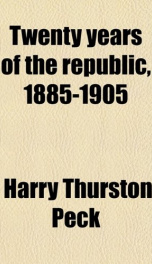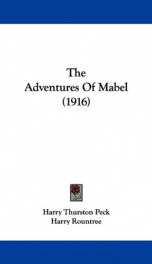twenty years of the republic 1885 1905

Purchase of this book includes free trial access to www.million-books.com where you can read more than a million books for free. This is an OCR edition with typos. Excerpt from book: CHAPTER III MEMORIES OF THE PAST How rapidly old issues and old causes were fading into political obscurity was impressed upon the mind of the American people by the passing away, early in President Cleveland's administration, of many men whose names evoked innumerable memories, but whose careers already had receded into history. In 1885, died George B. Mc- Clellan and Ulysses S. Grant; in 1886, Chester Alan Arthur, Winfield S. Hancock, Horatio Seymour, and Samuel J. Tilden. Of these distinguished men, two General Grant and Mr. Arthurhad been Presidents of the United States. ThreeGeneral McClellan, General Hancock, and Mr. Seymourhad been unsuccessful candidates for the Presidency. OneMr. Tildenwill probably remain unique in American history as having been prevented by political intrigue from taking possession of the chief magistracy to which his countrymen had called him. The names of General McClellan and General Grant are linked indissolubly with the annals of the Civil War. The history of the one not only supplements the history of the other, but affords a striking contrast. It was McClel- lan's fortune to begin the task which Grant completed. McClellan rests to-day beneath the shadow of imputed failure; Grant wears in history the laurels of supreme success. The final judgment of posterity is a judgment from which appeal is hopeless; yet in this one thing it is seldom wholly just. It takes no heed of circumstances or conditions. It makes no reservations. It exacts unqualified acceptance. It stands, with a stolidity that is almost brutal, upon the bed-rock foundation of bare results. In 1861, McClellan, then an ex-captain of Engineers, came to Washington to assume command of the nation's military forces in succession to the infirm and aged Scott. A few success...
Info about the book
Author:
Series:
Unknown
ISBN:
1171819536
Rating:
4.5/5 (4)Your rating:
0/5
Languge:
English
Users who have this book
Users who want this book
What readers are saying
What do you think? Write your own comment on this book!
write a commentif you like twenty years of the republic 1885 1905 try:
Do you want to exchange books? It’s EASY!
Get registered and find other users who want to give their favourite books to good hands!







